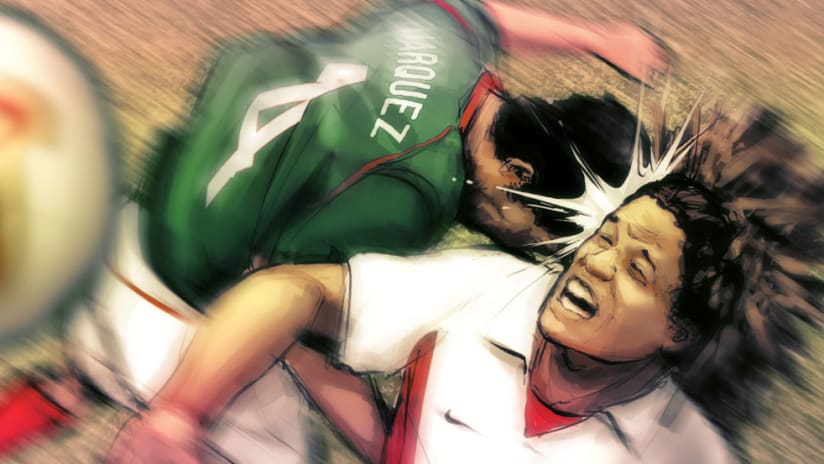In good times and bad, the US and Mexico national teams remain the Concacaf region's most heated international soccer rivalry. And this Wednesday marks the 18-year anniversary of the most important chapter in its history.
But no game in the rich history between the teams looms larger than the famous meeting at the 2002 FIFA World Cup. That's when, during a Round of 16 match on June 17 in the 2002 FIFA World Cup, the US overturned Mexico — the clear favorites — in a match that proved heart-stopping for American fans and heartbreaking for Mexican ones.
With a final score of 2-0 to the US, it helped cement the legend of Dos a Cero, and, say many of the players from the game, spark soccer's mainstream explosion among the American public.
Ahead of the Concacaf Cup meeting between the US and Mexico on Oct. 10, 2015, we reached 17 of the most influential players and coaches from those 2002 US and Mexico teams for an oral history detailing just what went down on and off the field that fateful day in Jeonju, Korea.
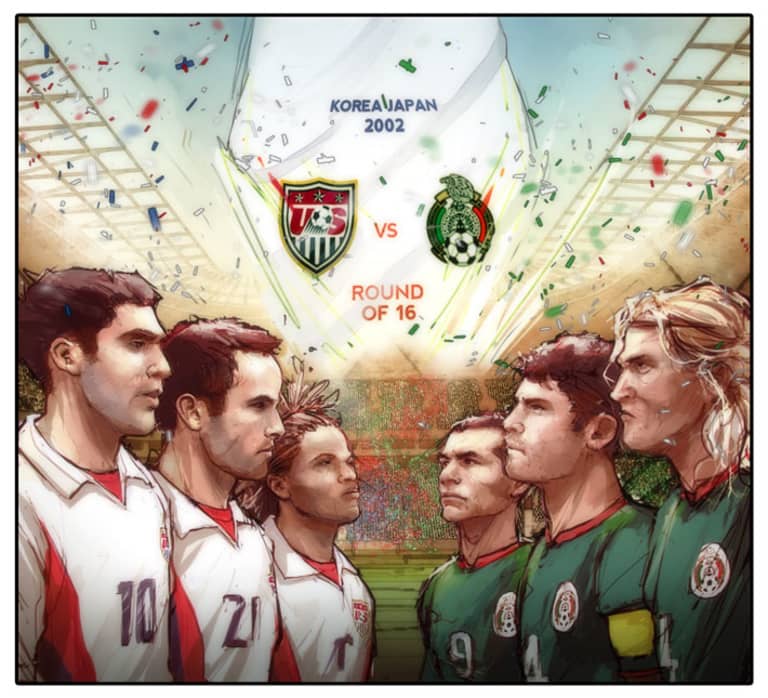
I. QUESTION OF FATE
Kasey Keller, US goalkeeper: We probably should have been knocked out when we lost to Poland [in group play]. We got a little bit lucky that Korea scored really, really late, almost in stoppage time against Portugal. So we kind of dodged a bullet by not getting knocked out. But then, by the way things happened, we ended up playing Mexico instead of Italy.
The combination between the elation of knowing that we screwed up and not getting knocked out, to then being able to play Mexico instead of Italy, it almost gave us a whole new level of confidence going into the match because we had been so successful against Mexico in recent times.
DaMarcus Beasley, US winger: We skipped the Brazils, the Englands and whoever, the big powerhouses, and it was a team right in our neighborhood. That's our biggest rival. Playing them in a World Cup, when do you ever get a chance like that? It was like you get a piece of cake and the cherry's on top. You want it and it's right there and you've got to go and get it.
Dave Sarachan, US assistant coach: We never feared them. We did a pretty good, thorough scouting report on them and understood their strengths and weaknesses, but we never felt as though we were inferior going into the game.
Brad Friedel, US goalkeeper: We were all really excited to get drawn against Mexico, because for so long – especially if you go back to the 90s, especially the early- and mid-90s – Mexico automatically thought when they played us they were going to win, automatically thought they were better than us. They thought the only way that we could get results against them was if we played them in cold climates and in the United States.
Landon Donovan, US forward: The issue for us was that we'd played pretty well in our first two games, and then the third game we really, really struggled. And so that was difficult, because we sort of were brought back down to earth by a [Polish] team that had no chance of advancing to the next round. I think there was some concern. I think [head coach] Bruce [Arena] was trying to find a way to keep us level-headed.
Oswaldo Sanchez, Mexico goalkeeper: The United States' team was developing at the moment. Their league was very new, and they didn't have many players in Europe, unlike today. We had all of the intentions to win and we expected to win.
Jared Borgetti, Mexico forward: It was one of those matches in which we had a lot to lose, and little to win, because on paper we were the favorites. Mentally it was not easy because we thought of what would happen if we lost, which is always a possibility. However, we knew it was almost an obligation for everyone that Mexico had to win the game because of its history.
Pablo Mastroeni, US midfielder: Once we got to the location, we got a call from President Bush and he told us he had a bet with the Mexican president [Vicente Fox] on the game. It just kind of put things in perspective. Whatever happened prior to that point was irrelevant.
Sanchez: We were not getting ready to play the United States. We were just playing the World Cup. That is the truth.
Claudio Reyna, US midfielder: There wasn't a player [on the Mexican team] we didn't know, whether it was the first player or the 25th player on their roster.
Tony Sanneh, US defender: We weren't going to respect anyone too much. We were going to try to physically break them down, outrun them and attack the goal. We knew we had some little advantages on set plays as well, and just tried to stay disciplined. We knew it was going to be chippy, so that was another big part of it, physically destroying them but mentally beating them as well.
Mastroeni: I was just ready to rock and roll ... Being in the midfield to break up plays and make things difficult for [Cuauhtémoc Blanco] was my role.
Sanchez: Our coach was [Javier] El Vasco Aguirre, and I remember he told us it was a match to be won, and the plan was to beat the United States by attacking them.
Borgetti: We would much rather have gone against an European team, where the game could have been more open, going back and forth, and not just having one team defend and another one attacking.
Donovan: Blanco was in his prime, Luis Hernandez in his prime, Rafa Marquez in his prime, and they were a typical Mexican team that had a lot of very skillful, talented people, they kept a lot of the possession. ... Our game plan was what it had been the whole World Cup, which was to be really good defensively and compact and wait for the opportunity to counter.
Bruce Arena, US head coach: We played a 3-5-2, and the reason we did that was we didn't have enough guys that could play, because Frankie Hedjuk was suspended, David Regis couldn't really play – he had a bad knee. So we had to kind of play with a back three and lean on the experience of Claudio and Eddie Lewis to hold down the flanks when needed. And they could certainly do that. I mean, if there was ever a time that Claudio gave for the team, that was it.
Sarachan: I think moving Claudio over to the right was a surprise, certainly for the Mexico team.
Reyna: I played out wide right and that gave me space to play and get the ball. We could also get other players who had to be on the field on merit, like Pablo Mastroeni and John O'Brien, in the midfield.
Gregg Berhalter, US defender: This is a team that had never played that system before.
Sarachan: Just like any big game, [our strategy was] starting out fast and being on the front foot. Getting the first tackle in, getting the first cross in, being first to everything. It's like any kind of neighborhood fight, if you back off, you show weakness.
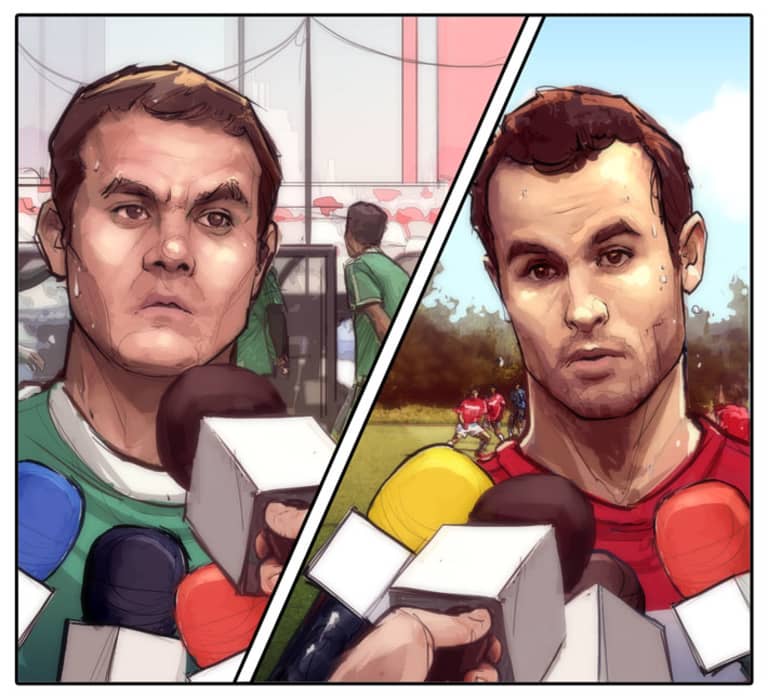
II. THE GAME BEGINS
Sarachan: When we got to the field an hour and a half before, it was like those old war movies, where on one side was the enemy, on the other side was the US. And I remember Mexico was walking the field on one half, and we were walking on the other, and they were all in their jeans shorts and polos. They had this arrogance about them. ... In our group – Earnie [Stewart], Cobi [Jones], Claudio, all the guys – kind of glanced over and just had this feeling of, "It's our day today."
Donovan: I was just on a high, right? Here I am, this young kid who never could have imagined playing in a World Cup at that age, and now I've played three games and I'm playing in a knockout stage ... I actually think if I had been older, it would have been more difficult, because I would have thought about it more, but I was just so excited.
Friedel: At that time, we were very, very calm. Very composed.
Borgetti: Mexico was the one pressured, and [the US] were going go play according to our desperation, and keep the game at 0-0 as long as they could. The best thing that could happen to them was to score an early goal, since we were going to become desperate and try to go forward and score the equalizer. We noticed their intention when the ball started rolling, which was to wait for us. Right there and then, you realize the game is going to be that way, one team attacking and one defending.
Donovan: As they came after us, it just opened up more space for counterattacks, so it played right into our hands and it was exactly what we wanted ...
Luis "el Matador" Hernandez, Mexico forward: Tactically we did not go out to play as a focused single group like we did in the group stage against Croatia, Ecuador, and even against Italy. Tactically, we failed.
The US struck early and aggressively. After only eight minutes, Reyna broke out on the right flank, speeding through an untrammeled 40-yard run, deftly fending off Mexican defender Ramon Morales and crossing the ball to Josh Wolff at the near post.
With just one touch, Wolff found a waiting Brian McBride, who found a pocket of space in the penalty area unmarked by Mexico's defense. From 12 yards, he blasted a shot into the back of the net for the game's first goal. Almost instantly, Mexico looked rattled.
Borgetti: When they scored the first goal, we felt as if we had already watched that movie in which we are persistent but they end up scoring against us.
Earnie Stewart, US midfielder: I'd say the first goal pretty much set the tone for everything. At that moment, I believe we really got the upper hand ... They started to get nervous about everything they were doing at that time. And we profited from that.
Mastroeni: It gave us confidence and belief and took the same thing away from Mexico.
Hernandez: [The game] didn't change when they scored the first goal – on the contrary, it changed from the beginning ... when the referee blew the whistle. There you realize that we were not committed. You feel it as a soccer player and right there and then I felt that there was something missing between the players.
After only 28 minutes, Mexico took Ramon Morales off the field, substituting in Hernandez and in doing so, El Tri seemed to concede an early mortal wound.
Arena: Once they took [Morales] out, it was like waving the white flag. They knew they'd [screwed] up.
Reyna: You never really feel comfortable. I think we were defending better and better as the game went on, but it was also deeper and deeper.
Borgetti: I remember in the second half there was a corner kick and I don't quite remember who headed the ball, whether it was Cuauhtemoc or someone else, and the ball hits the hand of a player from the United States, but the referee did not call the penalty kick. That would have been a penalty kick which if we scored, we would have tied the game and the outcome would have been different.
Sarachan: We got away with a hand ball, it might have been O'Brien, so we got a little break there. I just think we had a mentality within the group that was able to withstand the pressure that came, and then, obviously, the second goal, we knew it was over. Had a feeling it was over.
In the 65th minute, Donovan, then just 20 years old and playing in his first World Cup, sprinted down the right flank as Lewis ran down the left with the ball. Before Mexico's defense could close him down, Lewis guided a perfect cross to the far post. That's where Donovan wove between two Mexico defenders to slam home a header that made it 2-0 US.
Friedel: When Eddie had the ball, I was just thinking, "Hit the good cross," because he's got such a good left foot. If that's on the money, it's difficult – difficult to save, difficult to defend against, and it was.
Beasley: I was warming up on the side. Eddie was one of the best crossers of the ball and had one of the best left feet. He put it right on Landon's head, and [Landon] did what he always did and put it in the back of the net. I was right by the goal and saw the whole thing happen and was the first one to congratulate him ... At that point I knew it was over. ... That goal was what put Landon on the map, scoring that goal against Mexico.
Friedel: What I remember is having Eddie [Lewis] – who's pretty much non-emotional all the time, normally when he scores, he celebrates a little bit, puts his head down and comes back – having a big, big celebration.
Sanneh: We knew the writing was on the wall and it was very businesslike to get through the rest of it. They knew ... At 1-0 they were three feet behind us and then we pulled a mile away. Then it's like, "Alright, that's not going to happen," and then I think emotions start to get into it and obviously they lost their cool.
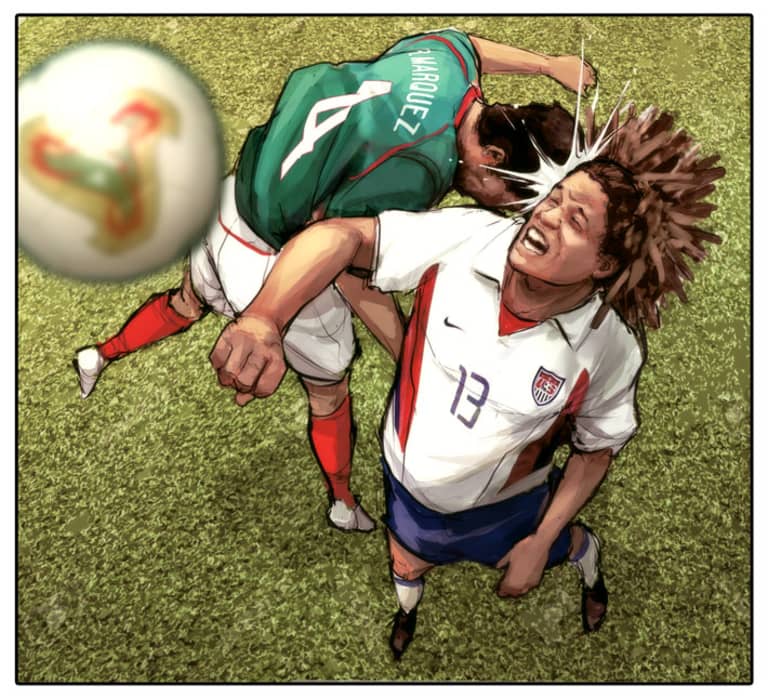
III. MEXICO LOSE THEIR COOL
Tony Meola, US goalkeeper: I remember at halftime guys talking about, "They [Mexico] are all over each other." They were killing each other on the field, they were arguing with each other, cursing at each other, and that's kind of a tell-tale sign. It was going to go one of two ways: either they're going to turn it around and come out fighting, or they're going to fold. We helped them fold a little bit.
Stewart: Up until about -- I want to say, the 70th minute or so -- it was a hard but decent game. After that, it turned a bit uglier.
Beasley: The rivalry from 2007 and before, it was bad. It was more tackles than soccer being played ... In 2002, those games were straight tackles. There were no cards.
Mastroeni: Those games were always physical against Mexico and we were always the catalysts. If you play a soft, tactical game against Mexico you're not going to come out ahead.
Hernandez: The United States' team is known for their strength and competitive play. That was no exception and they began to put in their tackles ... They could have tackled us very hard, but we also stopped doing our job.
Donovan: I actually didn't feel that way about that game, because I think I was just too naive. I was just so excited to be there, it didn't occur to me ....
I will say the worst comment I ever received from another player in my life was that day, by Luis Hernandez. And I probably deserved some sort of verbal comments from him, but this definitely took it overboard. I remember vividly. At one point we were talking – we were just jabbering back and forth – and something happened and he looked at me and he said, "I'm going to find your mother and I'm going to kill her." I was like, wow, this is a little more than a soccer game, I guess.
Reyna: The game was physical for a long portion of it and then they got cheap.
Tensions finally boiled over—in the 88th minute, Rafa Marquez steamed into a hopeless challenge and, many contend, intentionally kicked and head-butted Cobi Jones, drawing a straight red card.
Sanneh: Once they started to get behind, we knew that was coming. What we had to worry about more was the next game and not to fall into that CONCACAF fistfight.
Cobi Jones, US midfielder: I challenged Marquez and he came in and he basically – so people don't forget – he comes at me with his foot straight out, studs me in the thigh, in my hip with his studs, and then comes through and headbutts me in the side of the head. Now that's intended to hurt somebody.
Arena: Marquez was a guy who could fly off the handle.
Sarachan: Your immediate reaction is anger, but as long as there's no death involved or no major injuries, the next feeling was, "We got them. We got them. We're under their skin. We've got them," and that's what it's about.
Borgetti: Sometimes during a match, hopelessness makes you do things that are not good when you analyze them.
Sanchez: The United States also tackled very hard and hit us in a different manner. Perhaps those weren't deserving of a red card, but this is part of soccer.
Hernandez: I simply think that it was a deserved ejection. I think Rafa lost his composure.
Keller: It was nothing new from what we'd gone through multiple times. Ask Alexi Lalas when he got punched in the nuts, and ask different players that have been spit in the face off the ball and different things like that.
Josh Wolff, US forward: Guys would lose their heads. The key was for us was to not lose our head. When I say nasty, those games were nasty.
Jones: As I went to the sideline, I was smiling. I was smiling because I knew it had basically just sealed the victory for us.
Indeed, Mexico proved unable to rally in the remaining final minutes of the match. Up next for the US? A brief but spirited celebration, then three days of preparation before facing their next World Cup opponent, Germany.
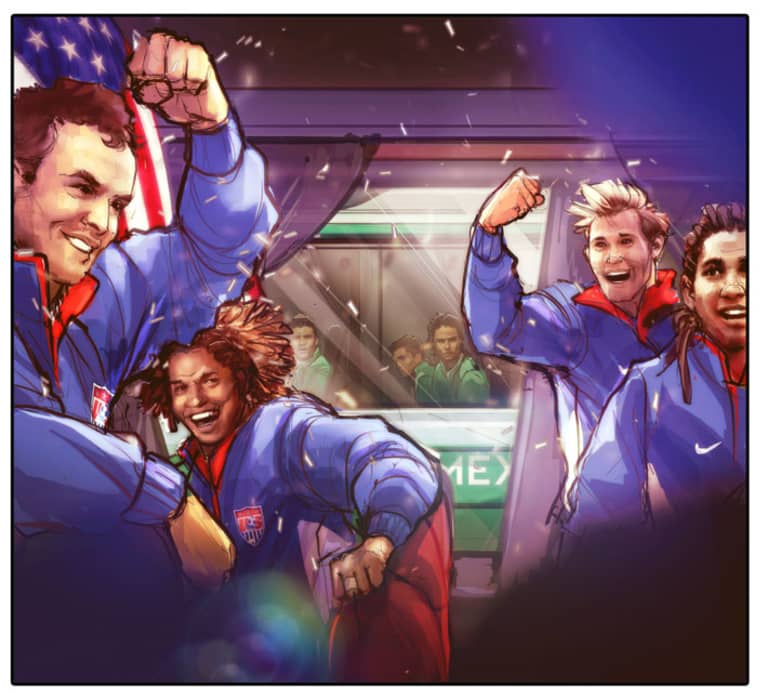
IV. TO THE VICTORS GO THE SPOILS
Reyna: Everyone was tired, but it was very joyous. We were celebrating. The great thing about that group was the guys who weren't playing were so excited and happy and taking part in the whole World Cup. A lot of different guys were in and out of the team, but the group was all together and just excited and happy.
Mastroeni: Being in the locker room after the game was one of the greatest experiences. I hadn't played in the previous two games and it felt like I was a part of something great. On that stage, any kind of hardships formed begin to splinter.
Donovan: I didn't have any context at that point, so I didn't realize that it was such a big deal for US Soccer. I didn't realize completely the historical significance yet. I just didn't fully grasp it. I was just excited to beat Mexico.
Borgetti: We lost so much to a team which on paper was inferior to us ... It was expected that we could lose against Portugal, which was a rival we could have faced in that round or any other European team, but not against this opponent. Everyone was sad; some were crying.
Sanchez: We were hoping to make history, but unfortunately we could not make history. Mexico has always made it to that round, and besides, losing to the United States made it even worse.
Sarachan: You're trying to just decompress and understand what you just did, but as a coach, you can't. The feeling is, "Okay, we're moving into territory that a US team hasn't moved into, and the next opponent is Germany, and let's get ready to play." There was a lot of euphoria, for sure. I do remember we took our time getting dressed and showering, and our bus was parked parallel to Mexico's bus.
Donovan: As we pulled out of the long driveway there that led into that stadium, there was a stoplight, so we were waiting briefly, and the Mexican team bus pulled up next to us. And at this point as we're on the bus, we're celebrating – I mean we're still celebrating. Everyone is jumping and laughing, having a good time, and we look over and see the Mexican team bus pull up, and it almost made the situation better because as their heads all turned toward us, they could see us celebrating.
Beasley: Yeah, they were pissed, but we were rubbing it in ... I think Cobi Jones led the whole bus in chants. They didn't like us then, and I'm sure that's another reason why they don't like us that much. We did win the game and we did gloat a little bit, but I think it was well deserved.
Jones: I think the most dramatic part was some of the [Mexico] fans took exception to it. A few of them were saying some words we can't say, basically cussing us out in a variety of different languages.
Hernandez: A long time passed before I could swallow that defeat.
Keller: You also have to understand that you still have another game. It's not like you just won and then you're going to go party. You have to kind of just appreciate the moment but then understand that then you're playing Germany in the quarterfinal. You can't get too emotionally crazy at that stage.
Germany knocked the US out, 1-0, in the World Cup quarterfinals on June 21, 2002. That game was not without controversy, either. In the second half, with Germany up 1-0, Berhalter bounced a shot off German goalkeeper Oliver Kahn, which then ricocheted off another defender, Torsten Frings.
The ball appeared to strike Frings in the arm, preventing a sure goal. Only the referee didn't see the handball, depriving the US of a penalty kick, potential man advantage and the opportunity to equalize. When the game ended, so did the Americans' hopes for advancing in the tournament.
Still, back home, the US men's national team's star shone brighter than ever before.
V. LASTING LEGACY
Jack Edwards, ESPN announcer: That the United States was even playing to get into the quarterfinals was astonishing, right? You think about how emotional that whole nine-month stretch was, from the US qualifying in the midst of the 9/11 terrorism attacks on New York and D.C. and Pennsylvania, and the immense security concerns that every member of the team had to go through.
There was a lot of emotion, a lot of fatigue, and when the ball rolled it was a pretty raw feeling. As somebody who had grown up playing soccer, played Division I college soccer and had a lot of friends in the US soccer community, it was just such a prideful moment for this sport to be able to stand on its own feet for once and say, "Yeah, we actually matter on the world stage."
Reyna: I remember right away the media guys saying there were a lot of people excited and we were on the cover of The New York Times. These things were new for US soccer, especially since we were halfway across the world.
That was pretty cool, that people back home were starting to wake up or were up in the middle of the night watching it.
Mastroeni: Shortly after that game, there were people on Letterman and stuff like that, and we began to understand how big it was back home. We had no concept of that. We were just secluded from the outside world and oblivious to the perception back home.
Berhalter: It was a great ride, that World Cup. We really felt the support of the country. It was a time when the performance really swept the nation. It was the first time I think, since '94, that the nation was that affected.
Arena: The pride is something that I think is lost today – how we worked really hard to build that team to have the right values and the right kind of people on the roster and represent our country. Just good old-fashioned American values; that's no longer the case anymore. ... It didn't mean it was perfect all the time – it certainly wasn't – but those guys who wore the US jersey were fabulous.
Donovan: That was a real turning point, in my opinion, in the rivalry, because it showed us we could beat them when we were playing on a level playing field.
Sarachan: I could be wrong, but I think that was the start of Dos a Cero. That was Dos a Cero, 2-0, and it's still the only time that the US has beaten Mexico in a World Cup. So we have that in our memory banks, that of all the times we've played them in friendlies and World Cup qualifying, we've beaten Mexico in a World Cup.
Beasley: Mexico had the better of the ball, but no one remembers that. They remember 2-0.
Jones: You can say [Dos a Cero] to Mexican fans anywhere and you can see a grimace come over their faces. Living in LA, I come across people all the time, and some people will talk about how great Mexico is, and all you gotta say is, "Dos a cero," and that keeps them quiet.
Hernandez: The United States had its moment in that World Cup; they do not leave a legacy, but just an experience to learn from.
Arena: I think the legacy of that game is more on the Mexicans. I think they're still bitter about it. I think for the US, it just reinforced what I believe in, that we were the best team in CONCACAF. And obviously over the last 10 years or so, maybe that's changed a little bit. It's on and off. But that's a huge hurdle to have jumped for our program.
Borgetti: The United States knows how to play against Mexico, and even when they play now, they do it the same way. There have been many years and friendly games that Mexico hasn't been able beat the United States. ... Certainly, the United States has gotten a lot better, but their style of play is a lot different than when they play against any other national teams. That is a reality even if they do not wish to openly say it; I think it is always the same strategy.
Sanneh: For a good eight years after that game I think we stayed on as the kings of CONCACAF and now it's a mutual battle of respect I think. In the early years they were they top dog and we were just fighting to get there from No. 2, and then I think we were at the top. Now it's kind of like we have two formidable opponents and I think nobody takes anything for granted anymore.
Friedel: The run itself in 2002 put US soccer on the map globally, in the eyes of other players around the world, the other staff around the world, the other federations around the world, the other leagues around the world. Really, that was probably the first time that people really got serious about what the United States could become in the future in soccer.
Donovan: Historically, that game is only going to get more and more relevant, because we may never play them again in a World Cup. If we do, then that game will get brought up again, but that can never ever be taken away from us.


